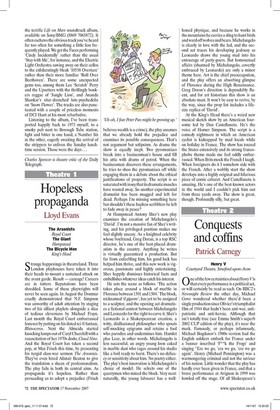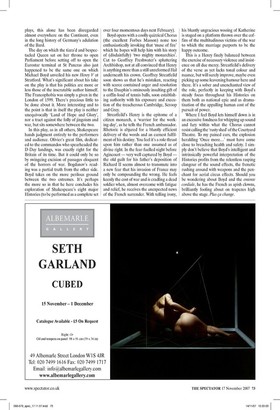Conquests and coffins
Patrick Camegy Henry V Courtyard Theatre, Stratford-upon-Avon ne of the few certainties aboutHemy Vis that every performance is apolitical act, or will certainly be read as such. On BBC2's Newsnight Review the other day, Michael Gove wondered whether there'd been a single production since Olivier's triumphalist film of 1944 that hadn't been anti-war, antipatriotic and anti-heroic. Although that isn't totally true (see Emma Smith's superb 2002 CUP edition of the play), it's near the mark. Famously, or perhaps infamously, Michael Bogdanov's 1980s version had the English soldiers embark for France under a banner inscribed 'F**k the Frogs' and singing "Ere we go, 'ere we go, 'ere we go again'. Henry (Michael Pennington) was a warmongering criminal and not the saviour of his nation. Little wonder that the play has hardly ever been given in France, and that a brave performance at Avignon in 1999 was howled off the stage. Of all Shakespeare's plays, this alone has been disregarded almost everywhere on the Continent, even in the long history of Germany's adulation of the Bard.
The day on which the tiara'd and bespectacled Queen sat on her throne to open Parliament before setting off to open the Eurostar terminal at St Pancras also just happened to be the same one on which Michael Boyd unveiled his new Henry V at Stratford. What's significant about his take on the play is that his politics are more or less those of the inscrutable author himself. The Francophobia was simply a given in the London of 1599. There's precious little to be done about it. More interesting and to the point is that in itself the play is neither unequivocally 'Land of Hope and Glory', nor a tract against the folly of jingoism and war, but sits somewhere between the two.
In this play, as in all others, Shakespeare hands judgment entirely to the performers and audience. Olivier's great film, dedicated to the commandos who spearheaded the D-Day landings, was exactly right for the Britain of its time. But it could only be so by swingeing excision of passages eloquent of the horrors of war. Bogdanov's reading was a partial truth from the other side. Boyd takes on the more perilous ground between the two extremes. It's perhaps the more so in that he here concludes his exploration of Shakespeare's eight major Histories (to be performed as a complete set over four momentous days next February).
Boyd opens with a coolly quizzical Chorus (the excellent Forbes Masson) none too enthusiastically invoking that 'muse of fire' which he hopes will help him with his story of (disdainfully) 'two mighty monarchies'. Cut to Geoffrey Freshwater's spluttering Archbishop, not at all convinced that Henry is anything more than a still unreformed Hal underneath his crown. Geoffrey Streatfeild soon shows us that he's mistaken, reacting with scarce contained anger and resolution to the Dauphin's ominously insulting gift of a coffin-load of tennis balls, soon establishing authority with his exposure and execution of the treacherous Cambridge, Scroop and Grey.
Streatfeild's Henry is the epitome of a citizen monarch, a 'warrior for the working-day', as he tells the French ambassador. Rhetoric is abjured for a bluntly efficient delivery of the words and an earnest fulfilment of his destiny. You feel it's a role thrust upon him rather than one assumed as of divine right. In the fear-fuelled night before Agincourt — very well captured by Boyd — the old guilt for his father's deposition of Richard II seems almost to transmute into a new fear that his invasion of France may only be compounding the wrong. He feels keenly the cost of war and is cradling a dead soldier when, almost overcome with fatigue and relief, he receives the unexpected news of the French surrender. With telling irony, his bluntly ungracious wooing of Katherine is staged on a platform thrown over the coffins of the multitudinous victims of the war to which the marriage purports to be the happy outcome.
This is a Henry finely balanced between the exercise of necessary violence and insistence on all due mercy. Streatfeild's delivery of the verse as yet lacks tonal colour and nuance, but will surely improve, maybe even picking up some leavening humour here and there. It's a sober and unenchanted view of the role, perfectly in keeping with Boyd's steady focus throughout his Histories on them both as national epic and as dramatisation of the appalling human cost of the pursuit of power.
Where I feel Boyd lets himself down is in an excessive fondness for whipping up sound and fury within what the Chorus cannot resist calling the 'rusty shed' of the Courtyard Theatre. To my pained ears, the explosion heralding 'Once more...' must have come close to breaching health and safety. I simply don't believe that Boyd's intelligent and intrinsically powerful interpretation of the Histories profits from the relentless rasping clangour of the sound effects, the frenetic rushing around with weapons and the penchant for aerial circus effects. Should you be wondering about Boyd and the entente cordiale, he has the French as apish clowns, brilliantly fooling about on trapezes high above the stage. Plus ca change.





































































 Previous page
Previous page